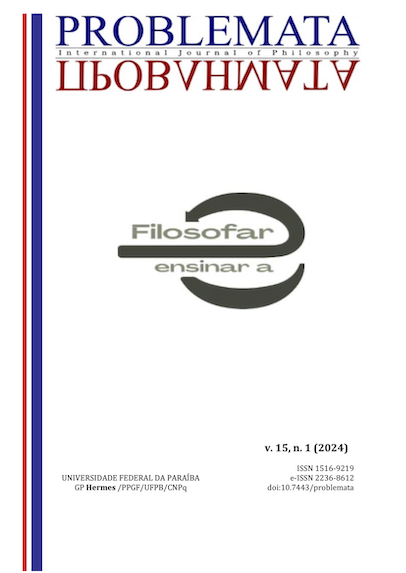THE RELEVANCE OF ACTORS OF THE PHILOSOPHY’S TEACHING AND THE CONJUNCTURE THAT SURROUNDS THEM
DOI:
https://doi.org/10.7443/problemata.v15i1.70218Keywords:
Teaching Philosophy, Public education, TeachingAbstract
In this article l will try to contribute to the reflection on the teaching of Philosophy in Brazilian basic education, highlighting the centrality of two of the main actors in this teaching (the student and the public school teacher). To this end, I also examine the current situation in which these actors interact, in order to think under what conditions the teaching of Philosophy takes place and how such conditions can or should influence such teaching.
Downloads
References
ALVES, D. O ensino de filosofia nos anos de repressão pós-1964. Ensaios Filosóficos, Rio de Janeiro/RJ, v. 10, dez. 2014.
ARROYO, M. Tensões nas condições e no trabalho docente: tensões na formação. Movimento: Revista de Educação, Ano 2, n. 2, 2015.
CALÇA, R. P.; FRANCISCO, M. F. S. Proletarização da Docência: da nobreza do trabalho intelectual à desqualificação do trabalho manual. Convenit Internacional (USP), v. 39, São Paulo, 2021.
CERLETTI, A. Ensinar filosofia: da pergunta filosófica à proposta metodológica. In: KOHAN, W. (Org.). Filosofia: Caminhos para seu ensino. Rio de Janeiro: Lamparina, 2008.
DAVID, R. Difficile égalité des chances: l'enseignement de la philosophie entre aristocratisme républicain et démocratisation improbable. Éditions Collège international de Philosophie, Paris, 2012.
GALLO, S. A filosofia e seu ensino: conceito e transversalidade. In: SILVEIRA, Renê J. T.; GOTO, Roberto (Org.). Filosofia no ensino médio: temas, problemas e propostas. São Paulo: edições Loyola, 2007.
KRUPSKAYA, N. A construção da pedagogia socialista. São Paulo: Expressão. Popular, 2017.
KRAWCZYK, N. Pesquisadoras “conversam” com PL 6.840 de reforma do Ensino Médio. Carta Capital na Escola. Opinião. Edição de 21 jul. 2015. Disponível em http://www.cartaeducacao.com.br/opiniao/pesquisadoras-conversam-com-pl-6-840-de-reforma-do-ensino-medio. Acesso em: 26 maio 2017.
MARIÁTEGUI, J. C. Política revolucionaria contribución a la crítica socialista: la escena contemporânea y otros escritos, Tomo 5. Tradução de Jhonatan Alcântara. Caracas: Fundación Editorial El perro y la rana, 2010.
MONSORES, E. C. Ensino Médio vai ter nova disciplina obrigatória em 2022: “Trabalho e Projeto de Vida”. Departamento Intersindical de Assessoria Parlamentar. 31 out. 2021. Disponível em: https://www.diap.org.br/index.p hp/noticias/noticias/90811-ensino-medio-vai-ter-nova-disciplina-obrigatoria-em-2022-trabalho-e-projeto-de-vida. Acesso em: 27 abr. 2023.
OBIOLS, G. Problemas no Ensino de Filosofia na escola média. In: OBIOLS, G. Uma introdução ao Ensino da Filosofia. Tradução de Sílvio Gallo. Rio Grande do Sul: Unijuí, 2002.
OLIVEIRA, R. P. Da universalização do Ensino Fundamental ao Desafio da Qualidade: uma análise histórica. Educação e Sociedade, Campinas, v. 28, n. 100-Especial, p. 661-690, out. 2007.
PEREIRA, R. Os jogos de linguagem e o ensino de filosofia: uma abordagem wittgensteiniana. 2014. Dissertação (Mestrado em Educação) - Faculdade de Educação, Universidade de São Paulo, São Paulo, 2014.
RONDON, R. No centro do sertão, o que é doideira às vezes pode ser a razão, ou sobre formação em filosofia e colonialismo. Revista Sul-Americana de Filosofia e Educação, n. 34, p. 34-42, 2021.
SAVIANI, D. Educação: do senso comum à consciência filosófica. São Paulo: Cortez, Autores Associados, 1980.
SILVA, F. L. Por que Filosofia no Segundo Grau? Estudos Avançados, São Paulo, 1992.
SILVA, M. R.; SCHEIBE, L. Reforma do ensino médio, pragmatismo e lógica mercantil. Revista Retratos da Escola, Brasília, v. 11, n. 20, p. 19-31, jan./jun. 2017.
Downloads
Published
Issue
Section
License
Copyright (c) 2024 Robson Pereira Calça

This work is licensed under a Creative Commons Attribution 4.0 International License.
Authors who publish with this journal agree to the following terms:
- Authors retain copyright and grant the journal right of first publication with the work simultaneously licensed under a Creative Commons Attribution License that allows others to share the work with an acknowledgement of the work's authorship and initial publication in this journal.
- Authors are able to enter into separate, additional contractual arrangements for the non-exclusive distribution of the journal's published version of the work (e.g., post it to an institutional repository or publish it in a book), with an acknowledgement of its initial publication in this journal.
-
- Authors are permitted and encouraged to post their work online (e.g., in institutional repositories or on their website) prior to and during the submission process, as it can lead to productive exchanges, as well as earlier and greater citation of published work (See The Effect of Open Access).





